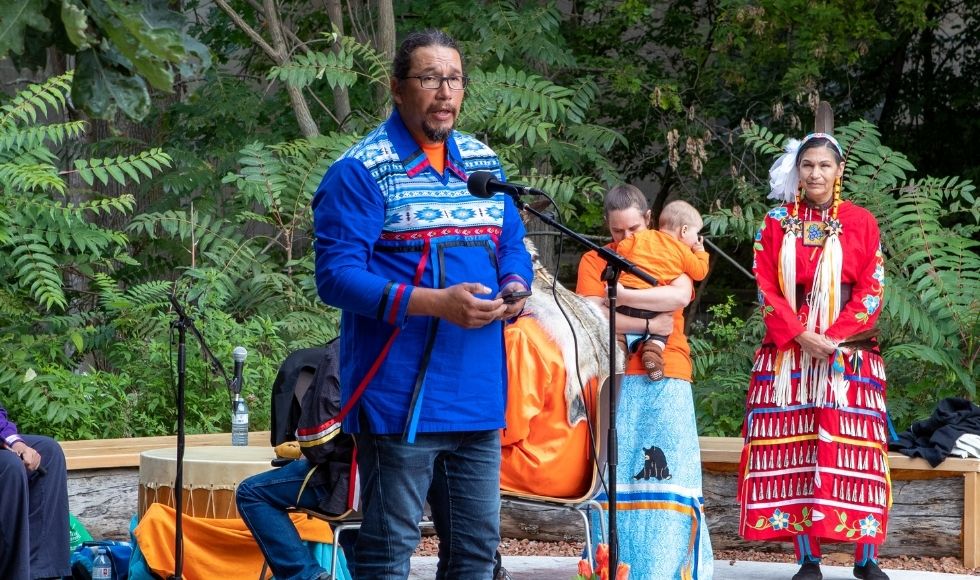‘No one can look away now. We can’t look away’

Community members gathered to mark Orange Shirt Day and the first National Day of Truth and Reconciliation at a moving ceremony at the Indigenous Circle.
Val King brought a baby eagle feather to the Orange Shirt Day event on campus Thursday.
“To me, it represents those little ones who were found,” she said, referring to the remains of children recovered at the sites of old residential schools.
King, a Mississauga of the Credit, Bear Clan, and a longtime member (and former chair) of the Indigenous Knowledge Helper Working Group in the Faculty of Health Sciences, was speaking at a gathering at the Indigenous Circle on McMaster’s campus, commemorating Orange Shirt Day, now also the National Day for Truth and Reconciliation. Several hundred people watched via livestream.
McMaster University’s Indigenous Studies Program, Indigenous Research Institute, Indigenous Student Services, and Indigenous Health Learning Lodge hosted the event, honouring the children who never made it home and those who survived. The commemoration recognized the ongoing legacy and intergenerational trauma caused by the residential school system, which affected an estimated 150,000 Indigenous children.
King, who is a long-standing and beloved member of the Indigenous Studies Program at McMaster, spoke of working as a young adult at a former residential school and finding horrifying remnants from its brutal past. She described learning as an adult about the profound trauma inflicted on family members and elders who felt unsafe even speaking of it except in the safety of her home.
“If you were giving something for your birthday or something meaningful, it was all taken away from you,” she says, describing the way children in the schools were denied their treasures, their heritage, their language and their individuality.
“They couldn’t hug their brothers and sisters, they couldn’t talk their own language … they got disciplined.”
King and several others who spoke reminded the gathering of both the troubling history and legacy of residential schools, and the optimism they feel about the next generation. Here is what some of the speakers said:
“When I think about those little ones, how many [could have been] doctors, healers, artists, singers, politicians? 150,000 were taken and 30,000 never came home. No one can look away now. We can’t look away.” — Val King
“The language, and the dancing and the singing — if you’re just going to sit there and observe it, you could just be watching it disappear, unless you get up and get involved. …You could be helping it grow that much bigger. Us coming together like this is what really sets that in motion.” — Jamie Johns, drummer and community member

“This is the Truth and Reconciliation book. All the actions are in there. Just pick one. That’s doing something.” — Val King, longtime member, Indigenous Knowledge Helper Working Group, Faculty of Health Sciences

“I’m kind of a long way from home and I don’t really have any family here. I really appreciate this space and this gathering. It’s familiar to me, the smell of the fire, the medicines, the families and even the accents make me feel comforted.” — Mary Pangowish, first-year Engineering student

“The Indigenous education and research strategy we’re launching today represents the voices of our community elders and knowledge helpers, students and faculty, that hopefully will yield many amazing scholars, professionals, advocates, artists and changemakers. Hopefully to make up for those who were lost, those 30,000 children.” — Bernice Downey, Associate Dean, Indigenous Health, Faculty of Health Sciences

“This is the first time in our history we’ve been taking time to acknowledge the survivors of the residential school system and to honour the memories of those children who did not come home. … Educators have a very special role to play in ensuring that what we teach provides a broad and accurate history of our nation and our institutions. We also have a responsibility to ensure that reconciliation at the centre of all our univ activities from the formation of ideas right through to their completion.” — David Farrar, President, McMaster University (seen here with Provost Susan Tighe and Bernice Downey)
Shortly after that, the Indigenous Education Council released its new education strategy, which will act as a guide for the university. Click here to learn more about the strategic plan.
Sept. 30, the National Day for Truth and Reconciliation, recognizes the ongoing and traumatic legacy of the residential school system and honours thousands of lost Indigenous children, survivors, their families and communities.
Click here to learn more about the Truth and Reconciliation Commission’s final report and calls to action.


